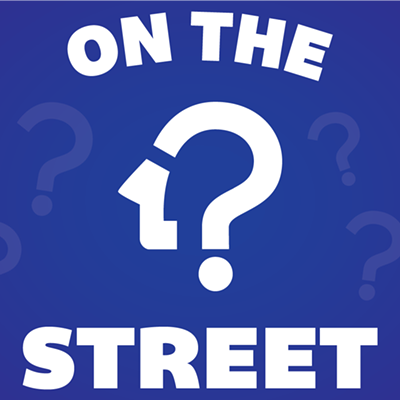Get a Lawyer
[
{
"name": "Broadstreet - Instory",
"insertPoint": "5",
"component": "25846487",
"requiredCountToDisplay": "5"
},{
"name": "Broadstreet - Instory",
"insertPoint": "10",
"component": "25846487",
"requiredCountToDisplay": "10"
},{
"name": "Broadstreet - Instory",
"insertPoint": "15",
"component": "25846487",
"requiredCountToDisplay": "15"
},{
"name": "Broadstreet - Instory",
"insertPoint": "20",
"component": "25846487",
"requiredCountToDisplay": "20"
}
]
by LUKE BAUMGARTEN & r & & r & & lt;span class= & quot;dropcap & quot; & W & lt;/span & hen I asked Joel Smith (local singer/songwriter, Inlander staffer) what he, as an artist, would want to ask a lawyer, he didn't have an answer. "That's not even on my mind." He's not alone.
Karli Fairbanks told me last week that she and Adam David are gearing up to record their second annual Christmas album with various area songwriters. "I want some covers," she said, "but they need to be public domain. We want to put the album on iTunes." Public domain works don't come with copyrights and can be freely recorded. Fairbanks and Smith both assumed that was the only option.
When I spoke with J. Michael Keyes, an intellectual property lawyer and partner at K & amp;L Gates in Spokane, I asked him if there were other avenues available. "They could get what's called a compulsory license, which allows an artist to record their own version of a song for a small rate," he said. The rate, in most cases, is nine cents per copy of the song. Skimming nine cents off the top of a $5 CD isn't bad, though that much off the top of an already slim iTunes margin probably won't appeal to anyone.
Either way, though, it's good to know your options, especially today. Licensing is on the rise and the Internet has leveled the playing field. Stranger things have happened than a new band with the right sound getting licensed for film, TV or advertising. Indeed, for most demographics (excluding baby boomer Cadillac-buyers, who groove to naught but Led Zep) the value is all in small and hip.
In January, Ice Age Cobra's "Acid Pony" was used in a Helly Hansen commercial. More recently, Hockey was asked to license two songs to an upcoming documentary. Granted, it's a documentary being directed by singer Ben Grubin's dad, but cheese is cheese.
These aren't incredibly auspicious examples, but million-dollar record deals aren't even remotely par for the course. The vast majority of working artists scrape together enough money to fund the next project or to pay next month's rent. Keyes says that's where a lawyer can come in handy -- specifically, Washington Lawyers for the Arts, a nonprofit that the state Bar Association has helped expand from Seattle to Eastern Washington. They provide free legal counsel to artists of all stripes. For musicians in these strange digital times, they can be especially helpful.
They're holding clinics twice in the fall, with the first happening this weekend. They're asking for a donation to defray costs, but $20 to clarify your career options ain't bad.
The Washington Lawyers for the Arts legal clinic at the Gonzaga University School of Law on Monday, Oct. 8 (and Dec. 3) from 6:30-8:30 pm. Donations requested. Appointments are required. E-mail [email protected] or call (206) 328-7053.
Karli Fairbanks told me last week that she and Adam David are gearing up to record their second annual Christmas album with various area songwriters. "I want some covers," she said, "but they need to be public domain. We want to put the album on iTunes." Public domain works don't come with copyrights and can be freely recorded. Fairbanks and Smith both assumed that was the only option.
When I spoke with J. Michael Keyes, an intellectual property lawyer and partner at K & amp;L Gates in Spokane, I asked him if there were other avenues available. "They could get what's called a compulsory license, which allows an artist to record their own version of a song for a small rate," he said. The rate, in most cases, is nine cents per copy of the song. Skimming nine cents off the top of a $5 CD isn't bad, though that much off the top of an already slim iTunes margin probably won't appeal to anyone.
Either way, though, it's good to know your options, especially today. Licensing is on the rise and the Internet has leveled the playing field. Stranger things have happened than a new band with the right sound getting licensed for film, TV or advertising. Indeed, for most demographics (excluding baby boomer Cadillac-buyers, who groove to naught but Led Zep) the value is all in small and hip.
In January, Ice Age Cobra's "Acid Pony" was used in a Helly Hansen commercial. More recently, Hockey was asked to license two songs to an upcoming documentary. Granted, it's a documentary being directed by singer Ben Grubin's dad, but cheese is cheese.
These aren't incredibly auspicious examples, but million-dollar record deals aren't even remotely par for the course. The vast majority of working artists scrape together enough money to fund the next project or to pay next month's rent. Keyes says that's where a lawyer can come in handy -- specifically, Washington Lawyers for the Arts, a nonprofit that the state Bar Association has helped expand from Seattle to Eastern Washington. They provide free legal counsel to artists of all stripes. For musicians in these strange digital times, they can be especially helpful.
They're holding clinics twice in the fall, with the first happening this weekend. They're asking for a donation to defray costs, but $20 to clarify your career options ain't bad.
The Washington Lawyers for the Arts legal clinic at the Gonzaga University School of Law on Monday, Oct. 8 (and Dec. 3) from 6:30-8:30 pm. Donations requested. Appointments are required. E-mail [email protected] or call (206) 328-7053.















